|
|
|
Sort Order |
|
|
|
Items / Page
|
|
|
|
|
|
|
| Srl | Item |
| 1 |
ID:
137366
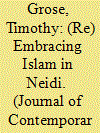

|
|
|
|
|
| Summary/Abstract |
This Xinjiang Class is a four-year, national-level boarding school program established by the Chinese Communist Party (CCP) in the year 2000. The overarching aim of the program is clear: the CCP intends to train a core group of young Uyghurs who have internalized the ideals of the Party. This article, which is based on interviews and regular interaction with over 60 graduates of the Xinjiang Class, casts doubt on whether the boarding schools have been effective in ‘interpellating’ young Uyghurs as compliant members of the Chinese Nation (Zhonghua minzu). This article contends that Uyghur graduates of the Xinjiang Class have instead embraced a non-Chinese ethno-national identity—an identity bound by Central Asian and Islamic cultural norms—and have largely rejected the Zhonghua minzu identity.
|
|
|
|
|
|
|
|
|
|
|
|
|
|
|
|
| 2 |
ID:
135540
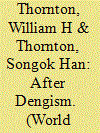

|
|
|
|
|
| Summary/Abstract |
The seeming departure of president Xi Jinping from Deng Xiaoping’s “pragmatic” moderation owes much to a highly tendentious misrepresentation of Deng’s core objectives. For 35 years, Dengism has been viewed through a globalist lens that flatly contrasts it with Maoist authoritarianism. From a post globalist vantage however, it appears that Deng’s reforms reconfigured rather than ended statist oppression. dengism was born out of the recognition that capitalism and authoritarianism were fully compatible and together were crucial for the survival of the CCP. “Opening China” China was Deng’s ironic mechanism for safeguarding against claims, which mandate a liberal corrective that Xi fears more than any other international contest. What he and other CCP elites dread most is a liberal post-globalisation that could foment a grassroots “China Spring”.
|
|
|
|
|
|
|
|
|
|
|
|
|
|
|
|
| 3 |
ID:
111304
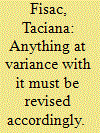

|
|
|
| 4 |
ID:
111303
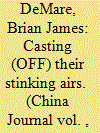

|
|
|
| 5 |
ID:
058711
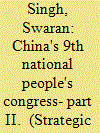

|
|
|
| 6 |
ID:
115347
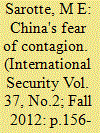

|
|
|
|
|
| Publication |
2012.
|
| Summary/Abstract |
The Tiananmen Square massacre of June 1989 remains a taboo topic in the People's Republic of China (PRC); the ruling Chinese Communist Party (CCP) still detains participants and suppresses online, popular, and scholarly discussions of it. The twentieth anniversary of the end of the transatlantic Cold War, however, saw the release of new sources from high-level contacts between the CCP and foreign leaders. These new sources, combined with older ones, show the extent to which Chinese political leaders were obsessed with the democratic changes in Eastern Europe and were willing to take violent action to prevent similar events on their territory. This obsession has received mention from a few scholars, but until now it has played too small a role in the current understanding of Tiananmen. New evidence documents that one of the main motivations for the CCP in deploying the army in June 1989-on the same day as semi-free elections in Poland-was its desire to combat possible contagion from the events in Europe. These sources also show that the CCP knew it had little to fear from reprisals by the United States, which it predicted would take "no real countermeasures."
|
|
|
|
|
|
|
|
|
|
|
|
|
|
|
|
| 7 |
ID:
051991
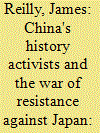

|
|
|
|
|
| Publication |
Mar-Apr 2004.
|
|
|
|
|
|
|
|
|
|
|
|
|
|
|
|
| 8 |
ID:
192512
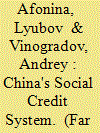

|
|
|
|
|
| Summary/Abstract |
China's nationwide social credit system (also called social rating system) aims to collect and analyze data on companies and individuals to assess their economic and social influence, civic qualities, responsibility, and financial reliability. The digital deterrence system for regulating public life appears to be a continuation of the Chinese social experiments of the second half of the 20th century. This time, however, social engineering uses previously unknown technical means free from the disadvantages of subjective evaluation and application under set parameters. Digitalization has thus provided another tool for assessing social behavior - an additional control system based on strict mathematical principles and, importantly, unlike legal systems, operating in real time. In terms of its regulatory function, it is comparable to ethnical norms and morality.
|
|
|
|
|
|
|
|
|
|
|
|
|
|
|
|
| 9 |
ID:
116210
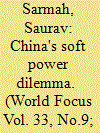

|
|
|
| 10 |
ID:
143772
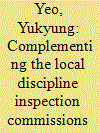

|
|
|
|
|
| Summary/Abstract |
Rampant corruption among China’s party members suggests that the existing system of party discipline is too fragile to function effectively. The question now is how the central leadership reinforces party supervision over leading cadres in both government and state firms. The Chinese leadership, after some period of experimentation, has introduced new institutions, named zhongyang xunshizu (central inspection groups), to complement the existing discipline system. This article examines how these central inspection groups complement the existing groups institutionally and normatively, and explores the Chinese Communist Party’s institutional engineering efforts to maintain legitimacy, organizational integrity and sustainability. This article considers these initiatives from the view of institutional complementarity and compensation. Theoretically, the application of institutional complementarity to China’s party discipline inspection should expand the scope of analysis into China’s institutional reform of party discipline. Empirically, the central inspection groups are the least known, but perhaps most significant, direct channel for central supervision of leaders in both local government and key state-owned enterprises. By comparing the rationale and operation of disciplinary inspection commissions (DICs), this article attempts to explain how the central inspection groups complement the supervision of local DICs in terms of scope, structure and methods of control.
|
|
|
|
|
|
|
|
|
|
|
|
|
|
|
|
| 11 |
ID:
153388
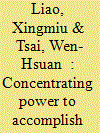

|
|
|
|
|
| Summary/Abstract |
This article discusses the operations of the Chinese Communist Party (CCP) pishi system from the perspective of decision making. As an authoritarian regime, the CCP ‘concentrates power to accomplish big things’, demonstrating the extent of the CCP’s state capacity. This article argues that, through a wide range of documentation, the CCP provides leaders with a channel for resource accumulation, to issue pishi (written directives). Next, mishu (secretaries) play an extremely important role in the transmission of documents and the execution of pishi. This article then goes on to point out that the CCP’s practice of nomenklatura is a key means to ensure that pishi are executed as expected. Finally, this article discusses the advantages and disadvantages of the pishi system.
|
|
|
|
|
|
|
|
|
|
|
|
|
|
|
|
| 12 |
ID:
095318
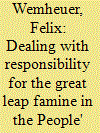

|
|
|
|
|
| Publication |
2010.
|
| Summary/Abstract |
In the aftermath of the famine in 1962, Mao Zedong took formal responsibility for the failure of the Great Leap Forward in the name of the central government. Thousands of local cadres were made scapegoats and were legally punished. This article focuses on the question of how the different levels of the Chinese state, such as the central government, the province and the county, have dealt with the question of responsibility for the famine. The official explanation for the failure of the Great Leap will be compared to unofficial memories of intellectuals, local cadres and villagers. The case study of Henan province shows that local cadres are highly dissatisfied with the official evaluation of responsibility. Villagers bring suffering, starvation and terror into the discourse, but these memories are constructed in a way to preserve village harmony. This article explains why these different discourses about responsibility of the famine are unlinked against the background of the "dual society"; the separation between urban and rural China. Finally, it will be shown that the Communist Party was unable to convince parts of society and the Party to accept the official interpretation.
|
|
|
|
|
|
|
|
|
|
|
|
|
|
|
|
| 13 |
ID:
076966
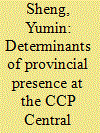

|
|
|
|
|
| Publication |
2007.
|
| Summary/Abstract |
Drawing on provincial-level time-series cross-section data for the period of 1978-2002, I test hypotheses on the determinants of Chinese Communist Party Central Committee (CC) membership shares for incumbent officials from different provinces. I find that officials from more populous provinces tended to take up higher alternate CC membership shares, but lower full CC membership shares. While urbanization is negatively associated with provincial alternate CC membership shares, there is little support for the role of other economic variables. The constrained nature of alternate CC membership implies greater 'symbolic representation' for the more populous and rural provinces on the national level in this period. These findings, based on considerations of distinct categories of CC membership, do not corroborate arguments sweepingly attributing CC representation to either provincial economic resources or performance.
|
|
|
|
|
|
|
|
|
|
|
|
|
|
|
|
| 14 |
ID:
137465
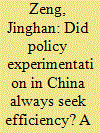

|
|
|
|
|
| Summary/Abstract |
Policy experimentation has been widely considered a ‘magic bullet’ of policy improvement and key to economic prosperity in China. This article, however, argues that policy experimentation in China does not always seek policy efficiency. Rather, it can be manipulated as a political symbol without actually affecting practices. By taking a case study on Wenzhou's financial reform, this article illustrates that local policy experimentation can serve as a mechanism for the central government to legitimately delay reform practices—in the case of Wenzhou's financial reform in 2012, out of a desire to maintain socio-economic stability during the power succession at the 18th Party Congress. In this reform, socio-economic stability was deemed more important than developing a sustainable and effective long-term policy. This article provides a new perspective on understanding policy experimentation in China by proposing the idea of ‘symbolic reforms’.
|
|
|
|
|
|
|
|
|
|
|
|
|
|
|
|
| 15 |
ID:
173978
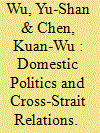

|
|
|
|
|
| Summary/Abstract |
This study examines the association between political competition (elections in Taiwan and political successions in China) and cross-Strait conflicts. We find that the Taiwan president has been more assertive toward mainland China during the election period or in his second term, than during the inter-electoral period or in the first term. The general secretary of the Chinese Communist Party (CCP) reacts to Taiwan’s provocations more harshly when he was in a period of power transition than when he had consolidated power. The two phenomena rest on the same assumption: when a political leader is domestically challenged, he cannot appear weak in external behaviors; when the leader is secure in his position, he can afford to make external concessions. We test the assumption against the empirical evidence from the cross-Strait relations of 1989–2012 and find the most serious conflicts occurred during Taiwan’s electoral period and when the CCP general secretary was in power transition. The study advances our understanding of how conflicts occur in cross-Strait relations and may lead to possible ways of their prevention.
|
|
|
|
|
|
|
|
|
|
|
|
|
|
|
|
| 16 |
ID:
095311
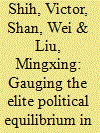

|
|
|
|
|
| Publication |
2010.
|
| Summary/Abstract |
Can one man dominate the Chinese Communist Party? This has been a much debated issue in the field of Chinese politics. Using a novel database that tracks the biographies of all Central Committee (CC) members from 1921 to 2007, we derive a measure of top CCP leaders' factional strength in the CC. We show that Mao could not maintain a commanding presence in the Party elite after the Eighth Party Congress in 1956, although the Party chairman enjoyed a prolonged period of consolidated support in the CC at a time when the CCP faced grave external threats. No Chinese leader, not even Mao himself, could regain the level of influence that he had enjoyed in the late 1940s. Our results, however, do not suggest that a "code of civility" has developed among Chinese leaders. The Cultural Revolution saw the destruction of Liu Shaoqi's faction. Although violent purges ended after the Cultural Revolution, Chinese leaders continued to promote followers into the CC and to remove rivals' followers
|
|
|
|
|
|
|
|
|
|
|
|
|
|
|
|
| 17 |
ID:
098101
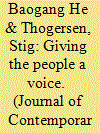

|
|
|
|
|
| Publication |
2010.
|
| Summary/Abstract |
In the last decade Chinese consultative authoritarianism has been renewed through many political and administrative innovations and tools. Authoritarian rule in China is now permeated by a wide variety of consultative and deliberative practices. These practices stabilize and strengthen authoritarian rule, leading to deliberative authoritarianism, an advanced form of consultative authoritarianism. This paper discusses two experiments-deliberative polling at Zeguo, Zhejiang, and a township election in Ya'an, Sichuan. Through these two cases we examine the direction which the development of consultative authoritarianism is presently taking, and the potentials and limitations of such input mechanisms in an authoritarian setting.
|
|
|
|
|
|
|
|
|
|
|
|
|
|
|
|
| 18 |
ID:
193260


|
|
|
|
|
| Summary/Abstract |
This article examines how civil-military relations have changed in China. This is conducted in the context of long-term efforts to make the military more professional and to understand how civilians and soldiers interact today. Current analyses of Chinese civil-military relations have focused on the military's professionalization. However, the recent evaluations do not entirely include the lessons learned from past professionalization phases in the People's Liberation Army's (PLA) history. I focus on the continuity between different events in China's civil and military history by looking at the critical links that made it possible for military professionalization to change what had happened before between the Chinese Communist Party and the PLA. The potential impact of further professionalization of the PLA in contemporary civil-military interactions is also examined.
|
|
|
|
|
|
|
|
|
|
|
|
|
|
|
|
| 19 |
ID:
066886
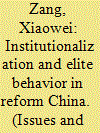

|
|
|
| 20 |
ID:
179175
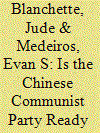

|
|
|
|
|
| Summary/Abstract |
As the Chinese Communist Party (CCP) prepares to commemorate on July 1 the 100th anniversary of its founding in 1921, it continues to confound policymakers and scholars with its expanding illiberalism amid persistent resilience, defying expectations of eventual moderation and inevitable collapse. From the vantage point of 2021, the CCP has demonstrated that it can adapt to both new and legacy challenges or, at a minimum, find creative ways to kick the can down the road. Not only is the Party resilient, it is also successful: today’s Communist Party controls more wealth, commands a more powerful military force, and can exert its influence over farther reaches of the globe than at any other point in its history.
|
|
|
|
|
|
|
|
|
|
|
|
|
|
|
|
|
|
|
|
|